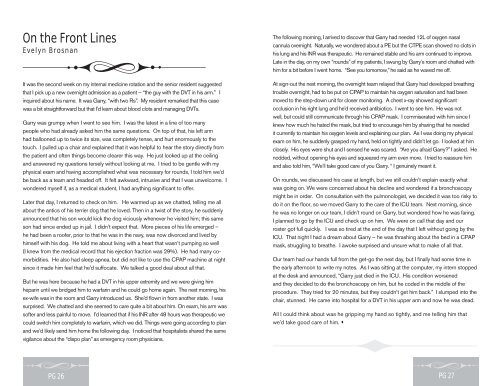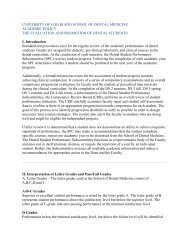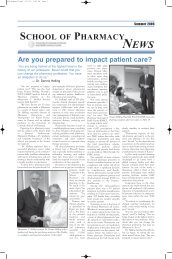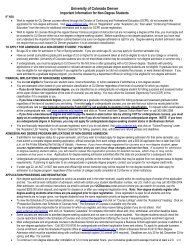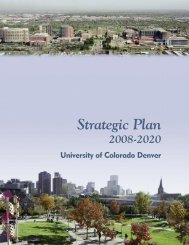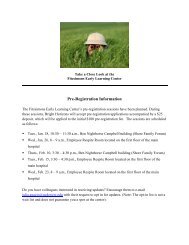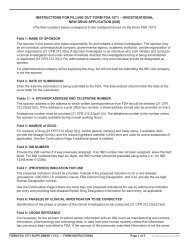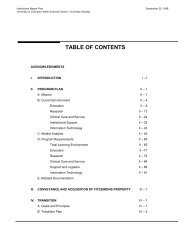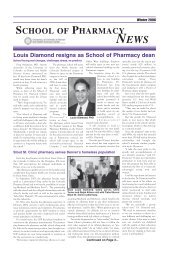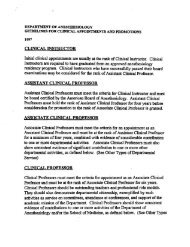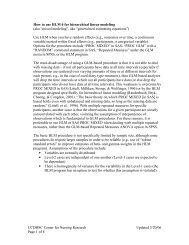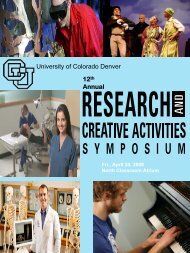The Human Touch 2013 - University of Colorado Denver
The Human Touch 2013 - University of Colorado Denver
The Human Touch 2013 - University of Colorado Denver
Create successful ePaper yourself
Turn your PDF publications into a flip-book with our unique Google optimized e-Paper software.
On the Front Lines<br />
Evelyn Brosnan<br />
It was the second week on my internal medicine rotation and the senior resident suggested<br />
that I pick up a new overnight admission as a patient – “the guy with the DVT in his arm.” I<br />
inquired about his name. It was Garry, “with two Rs”. My resident remarked that this case<br />
was a bit straightforward but that I’d learn about blood clots and managing DVTs.<br />
Garry was grumpy when I went to see him. I was the latest in a line <strong>of</strong> too many<br />
people who had already asked him the same questions. On top <strong>of</strong> that, his left arm<br />
had ballooned up to twice its size, was completely tense, and hurt enormously to the<br />
touch. I pulled up a chair and explained that it was helpful to hear the story directly from<br />
the patient and <strong>of</strong>ten things become clearer this way. He just looked up at the ceiling<br />
and answered my questions tersely without looking at me. I tried to be gentle with my<br />
physical exam and having accomplished what was necessary for rounds, I told him we’d<br />
be back as a team and headed <strong>of</strong>f. It felt awkward, intrusive and that I was unwelcome. I<br />
wondered myself if, as a medical student, I had anything signifi cant to <strong>of</strong>fer.<br />
Later that day, I returned to check on him. He warmed up as we chatted, telling me all<br />
about the antics <strong>of</strong> his terrier dog that he loved. <strong>The</strong>n in a twist <strong>of</strong> the story, he suddenly<br />
announced that his son would kick the dog viciously whenever he visited him; this same<br />
son had since ended up in jail. I didn’t expect that. More pieces <strong>of</strong> his life emerged –<br />
he had been a ro<strong>of</strong>er, prior to that he was in the navy, was now divorced and lived by<br />
himself with his dog. He told me about living with a heart that wasn’t pumping so well<br />
(I knew from the medical record that his ejection fraction was 29%). He had many comorbidities.<br />
He also had sleep apnea, but did not like to use the CPAP machine at night<br />
since it made him feel that he’d suffocate. We talked a good deal about all that.<br />
But he was here because he had a DVT in his upper extremity and we were giving him<br />
heparin until we bridged him to warfarin and he could go home again. <strong>The</strong> next morning, his<br />
ex-wife was in the room and Garry introduced us. She’d flown in from another state. I was<br />
surprised. We chatted and she seemed to care quite a bit about him. On exam, his arm was<br />
s<strong>of</strong>ter and less painful to move. I’d learned that if his INR after 48 hours was therapeutic we<br />
could switch him completely to warfarin, which we did. Things were going according to plan<br />
and we’d likely send him home the following day. I noticed that hospitalists shared the same<br />
vigilance about the “dispo plan” as emergency room physicians.<br />
<strong>The</strong> following morning, I arrived to discover that Garry had needed 12L <strong>of</strong> oxygen nasal<br />
cannula overnight. Naturally, we wondered about a PE but the CTPE scan showed no clots in<br />
his lung and his INR was therapeutic. He remained stable and his arm continued to improve.<br />
Late in the day, on my own “rounds” <strong>of</strong> my patients, I swung by Garry’s room and chatted with<br />
him for a bit before I went home. “See you tomorrow,” he said as he waved me <strong>of</strong>f.<br />
At sign-out the next morning, the overnight team relayed that Garry had developed breathing<br />
trouble overnight, had to be put on CPAP to maintain his oxygen saturation and had been<br />
moved to the step-down unit for closer monitoring. A chest x-ray showed significant<br />
occlusion in his right lung and he’d received antibiotics. I went to see him. He was not<br />
well, but could still communicate through his CPAP mask. I commiserated with him since I<br />
knew how much he hated the mask, but tried to encourage him by sharing that he needed<br />
it currently to maintain his oxygen levels and explaining our plan. As I was doing my physical<br />
exam on him, he suddenly grasped my hand, held on tightly and didn’t let go. I looked at him<br />
closely. His eyes were shut and I sensed he was scared. “Are you afraid Garry?” I asked. He<br />
nodded, without opening his eyes and squeezed my arm even more. I tried to reassure him<br />
and also told him, “We’ll take good care <strong>of</strong> you Garry. “ I genuinely meant it.<br />
On rounds, we discussed his case at length, but we still couldn’t explain exactly what<br />
was going on. We were concerned about his decline and wondered if a bronchoscopy<br />
might be in order. On consultation with the pulmonologist, we decided it was too risky to<br />
do it on the fl oor, so we moved Garry to the care <strong>of</strong> the ICU team. Next morning, since<br />
he was no longer on our team, I didn’t round on Garry, but wondered how he was faring.<br />
I planned to go by the ICU and check up on him. We were on call that day and our<br />
roster got full quickly. I was so tired at the end <strong>of</strong> the day that I left without going by the<br />
ICU. That night I had a dream about Garry – he was thrashing about the bed in a CPAP<br />
mask, struggling to breathe. I awoke surprised and unsure what to make <strong>of</strong> all that.<br />
Our team had our hands full from the get-go the next day, but I fi nally had some time in<br />
the early afternoon to write my notes. As I was sitting at the computer, my intern stopped<br />
at the desk and announced, “Garry just died in the ICU. His condition worsened<br />
and they decided to do the bronchoscopy on him, but he coded in the middle <strong>of</strong> the<br />
procedure. <strong>The</strong>y tried for 20 minutes, but they couldn’t get him back.” I slumped into the<br />
chair, stunned. He came into hospital for a DVT in his upper arm and now he was dead.<br />
All I could think about was he gripping my hand so tightly, and me telling him that<br />
we’d take good care <strong>of</strong> him. •<br />
PG 26<br />
PG 27


